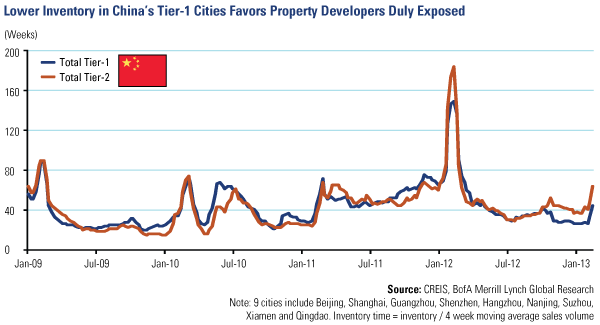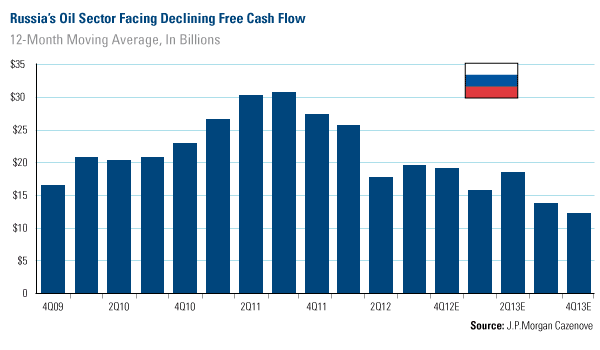Emerging Markets Radar (February 24, 2013)
Strengths
- Finance Minister Xie Xuren says China will maintain positive fiscal policy and prudent monetary policy, Xinhua News reported.
- China jewelry sales over the Chinese New Year period grew 38 percent, according to the Ministry of Commerce.
- January car sales were up 49.4 percent in China due to extra working days and strong demand for local brands and luxury names, particularly Audi and BMW.
- More than 4 million people from China participated in overseas group tours, up 14 percent year-over-year. Over 90 percent of the travelers went to Asian tourist sites and the hottest destinations were Thailand, Korea, Hong Kong, Macau and Taiwan. This is the reason tourist businesses in those countries and regions are enjoying double digit sales and earnings growth, which is one of the Asia megatrends that investors can potentially benefit from.
- Thailand fourth quarter GDP growth was 18.9 percent, better than the market consensus of 15.3 percent. The accelerated growth was broadly based in domestic and external demand. For 2012, Thailand GDP grew 6.4 percent.
- Malaysia fourth quarter GDP grew 6.4 percent versus the estimate of 5.5 percent, and improved from 5.3 percent in the prior quarter. For 2012, Malaysia GDP grew 5.6 percent.
- Poland’s debt rating outlook was raised to positive from stable by Fitch, which cited the country’s narrowing budget deficit, stabilizing government debt, and economic growth. The budget deficit narrowed by about 4.5 percent of GDP since 2010 to an estimated 3.4 percent last year.
- The Central Bank of Turkey shifted the interest rate corridor down by 25 basis points, while simultaneously raising reserve rate requirements by an average of 20 basis points. The bank acknowledged the strong capital inflow to the country and intends to preserve the financial stability by maintaining the low interest rate environment supported by the macro prudential measures.
- Banco Daycoval, S.A. of Brazil rose 6.46 percent, leading the financial sector in the Brazilian market this week following a strong earnings report, the issuance of a dividend, and the announcement of a share buyback program. A small bank compared to regional giants Itau and Bradesco, Daycoval outperformed by reducing its credit portfolio as credit delinquencies rose across the country. The Bovespa Sao Paulo Stock Exchange Index declined 2.35 percent for the week ended February 22.
Weaknesses
- In the China State Council meeting, Premier Wen Jiabao called on local governments to “decisively” curb housing prices from rising. In the meeting, China decided to expand property tax trials to more cities. The market had reacted negatively at the rumor but positively when the policy directory was confirmed on Friday.
- In separate news, the People’s Bank of China (PBOC) had withdrawn Rmb910 billion ($146 billion in USD) in the week, which followed a commentary on the central bank’s website that said it was concerned with potential inflation risk. The market is afraid that PBOC may start tightening money supply by restraining the fast growth of total social financing, which again may not happen immediately at this stage of growth recovery.
- Retail and restaurant sales during the Chinese New Year rose 14.7 percent to Rmb539 billion, the lowest pace in four years, according to the Ministry of Commerce. The market speculated this was due to anti-corruption efforts by the new leadership which curbed government officials from spending public funds for gift-giving and entertainment.
- Macau stocks dropped in the week on disappointing month-to-date February revenue growth which was up 2 percent but below market expectation, though mainland visitor growth was up 20 percent during Chinese New Year.
- Russian inflation jumped to 7.1 percent in January from 6.6 percent in December, exceeding the target range and bolstering the International Monetary Fund’s case that the central bank must refrain from easing monetary policy. The government had urged policymakers to cut rates after economic growth slowed to 3.4 percent last year.
- Russian retail sales grew 3.5 percent in January, according to Rosstat, the slowest pace in almost three years as unemployment rose and inflation sapped household purchasing power.
- Peruvian exports tumbled 16 percent in December together with the domestic construction industry bringing economic growth down to 4.3 percent compared to 6.8 percent in November. The strength of Peru’s construction industry had previously shielded the country’s commodity dependent economy from international commodity price fluctuations. Despite missing economic growth expectations local economists believe the construction industry will regain strength in 2013 and foresee no need to alter benchmark rates in the short term.
Opportunities

- As shown in the Chart above, inventories of houses available for sales in the tier 1 cities are low, which indicates rapid sales growth and a supply shortage. The structural land shortage in tier 1 cities favors developers who had plenty of land reserves and growing project pipelines. For the overall real estate sector in China, it is showing inventories are regressing to the average historical levels due to slower start-ups since the beginning of 2012, and rapid sales growth since the second half of last year, which also indicates healthy fundamentals for developers.
- In the current environment, when global slowdown fears come back to the fore, Indonesia, Philippines, Thailand, and Turkey may outperform again as money flows follow growth.
- The Pacific Alliance trade bloc was established in 2012 by Chile, Colombia, Mexico and Peru to bolster free trade and economic integration with Asia. The founding members have vowed to lower the barriers to do business with Chile at the forefront of this initiative. Chile has passed a law that will allow people to instantly register companies for free, has opted to provide selected start-ups with equity-free seed capital, and has significantly eased the path to obtaining Chilean residency. No surprise Chilean President Pinera welcomed European leaders to the Economic Commission for Latin America and the Caribbean (ECLAC) summit two weeks ago saying “Welcome to a better world.”
Threats
- The HSI (Hang Seng Index) Index fell through the 50-day moving average in a profit-taking week. The market found an excuse in the weaker-than-expected sector growth numbers during the Chinese New Year to take profit gained since early September of last year.
- Brazil’s latest inflation reading came out higher than expected at 6.18 percent, making it the eighth consecutive month of rising inflation above economists’ forecasts. The rising inflation continues to put pressure on the central bank to raise interest rates at a time when economic growth is hovering at 1 percent, far below the other BRIC countries. In addition, the country reported a $11.4 billion current account deficit for the month of January, a measure that is likely to increase with an interest rate hike, thus making a monetary tightening more likely to dampen economic growth.
- Despite record high oil prices, free cash flow generation of Russian integrated oil companies is diminishing due to: (i) higher taxes for extraction and (ii) rising costs, driven by higher pipeline and railroad tariffs, as well as double digit increases in electric power prices.











